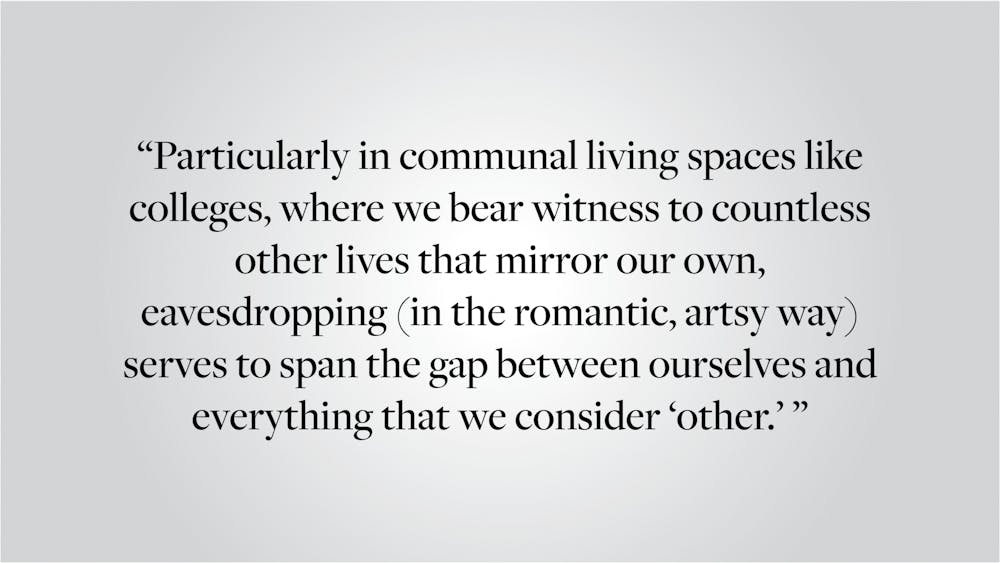Before beginning my work for the day, I unabashedly require an oat milk chai latte as served by the Barus and Holley Cafe. However, as much as I love those morning visits (and hate the constant draining of my Flex Points), I resist the urge to sit down in the warm, bustling cafe to start my studying. If I do, the risk of procrastination is simply too high, the draw of each of the dozens of conversations floating through the space too strong, each whisper of gossip too tempting, each burst of laughter too captivating to leave unexamined. Instead, I settle for the dreary silence of the Science Library basement.
The captivating nature of eavesdropping is to blame for my inevitable distraction. I find myself seeking the thrill of connecting to strangers through the simple link of coexistence, of hearing just a tiny snippet of their life. And, it seems that much of humanity shares this temptation: Trends in social media and even art point to a society-wide romanticization of eavesdropping in the 21st century.
The 1,475 (and counting) followers of @overheardatbrown420 on Instagram are my first indication of the pervasiveness of eavesdropping on College Hill. Though perhaps a more humorous example, this account records statements that were not just uttered in a vacuum, but by the community of Brown students — our community. It allows us to peer into the lives of our fellow classmates in their strangest, dumbest and most relatable moments — to enjoy the fact that each one of us here is living out a different storyline, each one as dramatic, turbulent and utterly fascinating as our own.
Even outside of the Brown community, eavesdropping has become an art in the form of “found poetry,” a style of poetry that borrows words from other sources — television ads, restaurant menus, sidewalk chalk and overheard conversation — and pieces them together into something else with a new, more complex meaning. For examples, look no further than the Museum of Modern Art’s exhibit on Eavesdropping: Art, Poetry and Everyday Encounters or The Paris Review’s discussion of a phenomenon called the “overheard haiku,” where simple sentences overheard in a crowd have been interpreted as art:
“She has a home phone.
Who has home phones? … Yeah different
lifestyle… Totally.”
or
“It’s just, right now I
don’t feel very much respect
for myself at all.”
However, all of this seems to contradict society’s general feelings about eavesdropping. The act has traditionally been frowned upon for being nosy and intrusive. So, what new force is driving the romanticization of this habit?
I suspect that this phenomenon might be caused by increased feelings of “sonder.” Sonder is defined by The Dictionary of Obscure Sorrows as the realization that everyone, everywhere, has a full life that doesn’t include you. This nuanced emotion is generally associated with existential crisis and a longing for the diverse range of human experience that we simply don’t have time to fully witness. It seems natural that this would lead to the romanticization of others’ lives and, subsequently, their conversations.
It makes sense that sonder would emerge in the internet age more frequently and with greater strength than ever before. For one, we have greater knowledge of what we are missing. Instagram allows us to witness millions of lives through pictures at the tap of a finger, while Reddit encourages the broadcasting of deeply personal life experiences under the security of anonymity. A newer social media platform, BeReal, contains a “Discovery” feed of raw, unfiltered snapshots of strangers’ daily lives. The effect of these platforms is a greater awareness of each other and of the scale of the world — precisely the feeling that “sonder” refers to. Besides, the internet’s mark on us goes beyond heightened awareness of one another. Experts fear that our hyperconnectivity online has caused us to feel less satisfied with the smaller scale of real-world interactions, leaving us searching for more meaning in our day-to-day lives.
Ultimately, it makes sense that the internet could serve as an upsetting reminder of the fact that humanity’s collective life on Earth is so much more complex and compelling than we can ever fully appreciate. To fill that newfound void, it makes sense that we romanticize the few small windows into the collective that we gain through eavesdropping.
Existential dread aside, maybe this is not a bad thing. Particularly in communal living spaces like colleges, where we bear witness to countless other lives that mirror our own, eavesdropping (in the romantic, artsy way) serves to span the gap between ourselves and everything that we consider “other.” As long as it doesn’t turn into outright violations of privacy, perhaps it is just an innocent way to connect more richly with the environment around us, something vaguely reminiscent of a movie called “The Map of Tiny Perfect Things.” In this “Groundhog Day” knockoff, a boy and girl repeating the same day choose to spend their time searching for every “tiny, perfect” moment: angel wings painted on a bus line up perfectly with a man sitting on a bench, an eagle catches a fish, a four leaf clover is spotted. By eavesdropping, maybe we, too, can stumble across those little moments of meaning. We can learn to be present, to observe our surroundings with curiosity and to live as my favorite poet, Mary Oliver, instructed: “Pay attention. Be astonished. Tell about it.”
Eva Schiller ’25 can be reached at eva_schiller@brown.edu. Please send responses to this opinion to letters@browndailyherald.com and other op-eds to opinions@browndailyherald.com.





